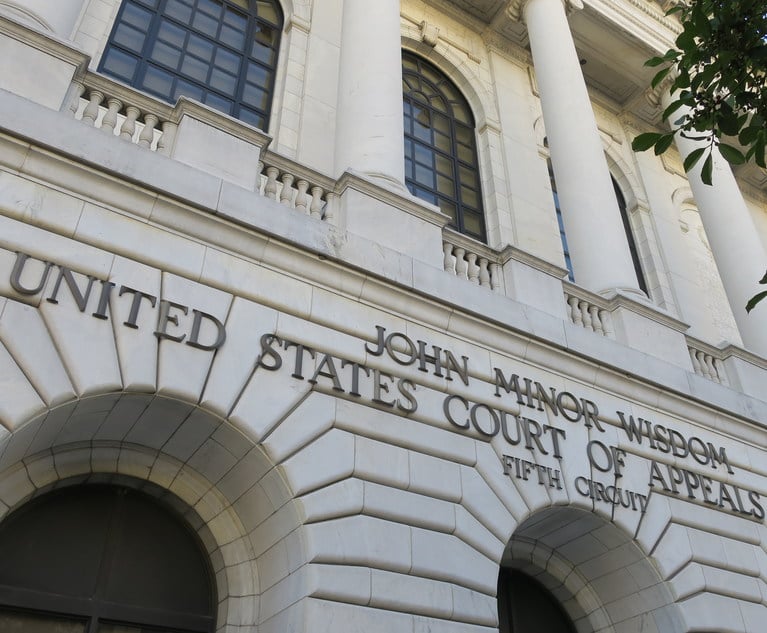Justices Open New Avenue of Defense Under Old Civil Forfeiture Law
While money's mere proximity to illegal drugs is sometimes sufficient to establish a substantial nexus between the two for the purposes of civil asset forfeiture, it's not always enough, the Pennsylvania Supreme Court has ruled.
December 21, 2017 at 03:53 PM
7 minute read
 Shutterstock.com
Shutterstock.com While money's mere proximity to illegal drugs is sometimes sufficient to establish a substantial nexus between the two for the purposes of civil asset forfeiture, it's not always enough, the Pennsylvania Supreme Court has ruled in a case that examined the burden-shifting scheme of a now outdated version of the Pennsylvania's Controlled Substances Forfeiture Act.
Under the previous version of the law, which has since been supplanted by the Civil
Asset Forfeiture Reform Bill enacted in July, some lower courts had held that the only way claimants could recover money seized by law enforcement because of its proximity to drugs was to show that they were the “innocent owner” of the money and had no involvement in the underlying drug transaction. In other words, claimants would have to start with the presumption that the money had a connection to a drug transaction and then seek to distance themselves from that crime by showing they had possessed or used the money lawfully.
But the Supreme Court's Dec. 19 ruling in Commonwealth v. $34,440.00 U.S. Currency stood for the proposition that, in some cases, a claimant could argue that the money never had a connection to a drug crime, requiring the state to put forth more evidence to the contrary than just the money's proximity to controlled substances at the time it was found.
The high court ruled 5-2 to reverse a ruling by the Commonwealth Court and remand the case to a Monroe County trial court. The justices said both lower courts erred in holding that the so-called “innocent owner” defense, found at Subsection 6802(j) of Pennsylvania's Controlled Substances Forfeiture Act, was the sole means by which a claimant could rebut the presumption that money found near controlled substances was derived from the sale of those substances.
“Rather, for the reasons set forth below, we conclude that the presumption may be rebutted by demonstrating that the seized currency is not the proceeds of drug sales, independent of a claimant's ability to satisfy the innocent owner defense,” Justice Max Baer wrote for the majority, joined by Justices Debra Todd, Christine L. Donohue, Kevin M. Dougherty and David N. Wecht. “If the Subsection 6801(a)(6)(ii) presumption has been rebutted sufficiently, the burden of proof remains with the commonwealth such that it must put on further evidence of a nexus to drug activity beyond the mere propinquity between the money and controlled substances.”
Baer said the innocent owner defense is an affirmative defense through which claimants can seek to disassociate themselves from underlying illegal activity. So, in a case in which money is found near illegal drugs and seized by law enforcement as the presumed proceeds of drug sales, a claimant can recover the money by showing that they were the owner of the money, that they acquired the money lawfully, that they did not unlawfully use or possess the money and—if the money was acquired by or used for drug transactions by someone else—that the claimant did not know about or consent to the criminal activity.
But, as set forth in the rebuttable presumption laid out in Subsection 6801(a)(6)(ii), a claimant can alternatively argue that the money had no connection to drug activity whatsoever, Baer said. At that point, the burden remains with the state to put forth more evidence of a nexus between the money and the illegal activity.
“In summary, where the Subsection 6802(j) innocent owner defense allows claimants to recover property notwithstanding its connection to drug activity, Subsection 6801(a)(6)(ii), by its plain terms, confers an opportunity to rebut the specific fact that the seized money was derived from drug sales, independent of proving the innocent owner defense,” Baer said, but acknowledged in a footnote that the ruling was based only on the language of the now defunct version of the Forfeiture Act.
“Moreover, it is beyond the scope of this opinion to discuss the specific effect of the newly enacted statute on the commonwealth's burden in forfeiture proceedings,” Baer said.
According to court documents, a car driven by Juan Lugo was pulled over for tailgating on Interstate 80 in Monroe County, and a state trooper's search revealed four ecstasy pills and four small bags of marijuana, as well as the cash, which was hidden under a seatbelt attachment. All were confiscated.
Falette testified that he was Lugo's friend and that the cash came from settlement proceeds he received in a personal injury lawsuit, court documents said. Falette also said he placed the money in the vehicle to show it off to friends, an explanation the trial court found “illogical and devoid of any credibility.”
On appeal, Rafael Falette argued there was none of the typical evidence used to demonstrate a nexus between cash and the sale of drugs, such as traces of drugs on the money, a canine sniff of the money, drug-related paraphernalia or a history of drug crimes for the vehicle's occupants. He also said his unrebutted testimony established him as an innocent owner of the cash.
The state argued that it met its burden via the rebuttable presumption provision in the Forfeiture Act, and Falette failed to meet his innocent-owner burden because of the trial court's finding that his explanation was implausible.
The Commonwealth Court said the state sufficiently established close proximity between the cash and drugs to trigger the statutory presumption, in part because the drugs were within arm's length of the cash. The appellate court said it was not positioned to disturb the lower court's credibility determination on Falette's version of events so he failed to satisfy his burden of proof that he was an innocent owner.
In his dissent from the Supreme Court majority, Chief Justice Thomas G. Saylor said allowing claimants to rebut the presumption created by proximity by arguing that there is no corroborative evidence to support that presumption “would facially contravene the directive of the statutory presumption.”
“Instead, I am of the view that a claimant must establish that he owned and lawfully acquired the currency, whether by proffer of his own evidence or developed based on the commonwealth's presentation, thus refuting the presumed conclusion that the money was derived from illicit substance sales,” said Saylor, who was joined in the dissent by Justice Sallie Updyke Mundy.
Mundy wrote separately to add that, in Falette's case, the trial court already rejected Falette's explanation of where the $34,440 came from.
“Based on the trial court's credibility determinations, which we must accept on appeal,
the trial court applied the facts to the law and concluded that Falette failed to establish
the innocent owner defense,” she said.
Falette's attorney, Brandon R. Reish of Stroudsburg, said that while the new law goes a long way toward remedying the issue addressed in this case, there are still a number of pending cases in which this decision will have an impact.
“I'm happy it provides an additional protection for those cases for which it will apply,” he said. “It's an important decision for my client.”
A spokesman for the Pennsylvania Office of Attorney General said in an email: ”We will continue to ensure that drug dealers don't profit from their illegal activity and will abide by the court's ruling to meet our burden of proof.”
This content has been archived. It is available through our partners, LexisNexis® and Bloomberg Law.
To view this content, please continue to their sites.
Not a Lexis Subscriber?
Subscribe Now
Not a Bloomberg Law Subscriber?
Subscribe Now
NOT FOR REPRINT
© 2025 ALM Global, LLC, All Rights Reserved. Request academic re-use from www.copyright.com. All other uses, submit a request to [email protected]. For more information visit Asset & Logo Licensing.
You Might Like
View All
Superior Court Rejects Pa. Hospital's Challenge to $7.3M Med Mal Judgment
3 minute read

Pa. Appeals Court: Trial Judge Dismissed Med Mal Claims Without Giving Plaintiffs Proper Time to Fight Back
4 minute read
Legal Issues to Watch in the US Appeals Courts in 2025
Trending Stories
Who Got The Work
Michael G. Bongiorno, Andrew Scott Dulberg and Elizabeth E. Driscoll from Wilmer Cutler Pickering Hale and Dorr have stepped in to represent Symbotic Inc., an A.I.-enabled technology platform that focuses on increasing supply chain efficiency, and other defendants in a pending shareholder derivative lawsuit. The case, filed Oct. 2 in Massachusetts District Court by the Brown Law Firm on behalf of Stephen Austen, accuses certain officers and directors of misleading investors in regard to Symbotic's potential for margin growth by failing to disclose that the company was not equipped to timely deploy its systems or manage expenses through project delays. The case, assigned to U.S. District Judge Nathaniel M. Gorton, is 1:24-cv-12522, Austen v. Cohen et al.
Who Got The Work
Edmund Polubinski and Marie Killmond of Davis Polk & Wardwell have entered appearances for data platform software development company MongoDB and other defendants in a pending shareholder derivative lawsuit. The action, filed Oct. 7 in New York Southern District Court by the Brown Law Firm, accuses the company's directors and/or officers of falsely expressing confidence in the company’s restructuring of its sales incentive plan and downplaying the severity of decreases in its upfront commitments. The case is 1:24-cv-07594, Roy v. Ittycheria et al.
Who Got The Work
Amy O. Bruchs and Kurt F. Ellison of Michael Best & Friedrich have entered appearances for Epic Systems Corp. in a pending employment discrimination lawsuit. The suit was filed Sept. 7 in Wisconsin Western District Court by Levine Eisberner LLC and Siri & Glimstad on behalf of a project manager who claims that he was wrongfully terminated after applying for a religious exemption to the defendant's COVID-19 vaccine mandate. The case, assigned to U.S. Magistrate Judge Anita Marie Boor, is 3:24-cv-00630, Secker, Nathan v. Epic Systems Corporation.
Who Got The Work
David X. Sullivan, Thomas J. Finn and Gregory A. Hall from McCarter & English have entered appearances for Sunrun Installation Services in a pending civil rights lawsuit. The complaint was filed Sept. 4 in Connecticut District Court by attorney Robert M. Berke on behalf of former employee George Edward Steins, who was arrested and charged with employing an unregistered home improvement salesperson. The complaint alleges that had Sunrun informed the Connecticut Department of Consumer Protection that the plaintiff's employment had ended in 2017 and that he no longer held Sunrun's home improvement contractor license, he would not have been hit with charges, which were dismissed in May 2024. The case, assigned to U.S. District Judge Jeffrey A. Meyer, is 3:24-cv-01423, Steins v. Sunrun, Inc. et al.
Who Got The Work
Greenberg Traurig shareholder Joshua L. Raskin has entered an appearance for boohoo.com UK Ltd. in a pending patent infringement lawsuit. The suit, filed Sept. 3 in Texas Eastern District Court by Rozier Hardt McDonough on behalf of Alto Dynamics, asserts five patents related to an online shopping platform. The case, assigned to U.S. District Judge Rodney Gilstrap, is 2:24-cv-00719, Alto Dynamics, LLC v. boohoo.com UK Limited.
Featured Firms
Law Offices of Gary Martin Hays & Associates, P.C.
(470) 294-1674
Law Offices of Mark E. Salomone
(857) 444-6468
Smith & Hassler
(713) 739-1250





